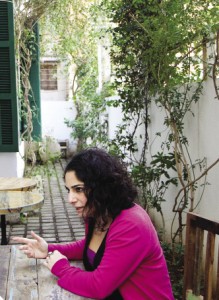She’s Turning Down Politicized Funding

Last December, as Egyptians gathered in Cairo’s Tahrir Square to protest against the military council then ruling their country, a shocking video of security forces beating a woman protester was posted on the Internet. The “blue bra woman,” as she became known (named for the undergarments exposed during her beating), inspired further protest against Egypt’s military leaders, and became a symbol across the world of women’s empowerment.
Women’s equality has long been at the top of the American foreign policy agenda, points out Muzna al-Masri, MA ’05, a Lebanese peace activist, consultant and candidate for a doctorate in anthropology. At the same time, however, the United States supported the very military regime responsible for the beating of that empowered woman in Tahrir Square. To al-Masri, this shows the political hypocrisy embedded in the peace and development projects funded by Western governments.
The same week that video of the blue bra woman appeared online, al-Masri received an invitation to lead a U.S.-funded meeting on empowering Iraqi and Afghan women. Al-Masri turned the offer down, feeling it would have been dishonest to participate in a U.S.-funded project for people from countries under American military occupation.
Funding, she continues, is an immense problem in the world of peacebuilding and development. A huge proportion of aid to the Middle East comes from USAID and other government agencies, most with attached political agendas. One example is USAID’s policy barring its consultants from working with people or organizations associated with “terrorism,” as defined by the U.S. government, which al-Masri says often correlates simply to opposition to American foreign policy. One of the groups labeled “terrorist” is Hezbollah, which, separate from its armed wing, operates as a political party with elected representatives in the Lebanese parliament and enjoys widespread support throughout much of the country.
“I find it unacceptable to claim to engage in peacebuilding efforts when under [that policy] I would be unable to work with anybody related to a political group that represents at least a third of Lebanon’s population,” she says.
Furthermore, the perceived bias of international aid projects within the Middle East has made them the targets of attacks, leading to a “securitization” of aid and peacebuilding work. Is there not something fundamentally wrong, she asks, about the increasingly common practice of armed security contractors accompanying peace and development workers into the field?
For all these reasons, al-Masri – who became involved in rights and peace activism as a college student 20 years ago – is selective in the peacebuilding work she undertakes for pay. She refuses work from any project or organization funded by USAID or other donors whose involvement is not ultimately in the best interests of the people the project claims to serve. Al-Masri adds that she does not consider herself a purist, because scrutinizing sources of funding is a responsibility of all peacebuilders.
“I will continue to be at the margin of peacebuilding work now,” says al-Masri, who has turned down more than a dozen job offers because of their funders. (She attended CJP as a U.S.-funded Fulbright scholar, noting that she respects that program’s mission to promote mutual understanding between Americans and people from other countries.)
She points again to Egypt, where countless foreign government-funded projects spent countless dollars trying to foster democratic change, empower women, organize youth and achieve other, similar goals. As it turned out, however, actual change – the kind demanded and effected by the crowds in Tahrir Square – was driven by bloggers, labor unions, the young and frustrated, and others at the margins of professionalized peacebuilding and development.
In 2010, Masri began working on her PhD at Goldsmiths, University of London. This was her way of escaping being tainted by externally funded peace and development work. She plans to earn her living in academia, while remaining involved in peace work in Lebanon primarily as a volunteer activist.
That is how it was when she first became involved in the field nearly 20 years ago, and that is how al-Masri sees that it was for the blue bra woman in Cairo – her impact superseding the billions spent by USAID. — AKJ